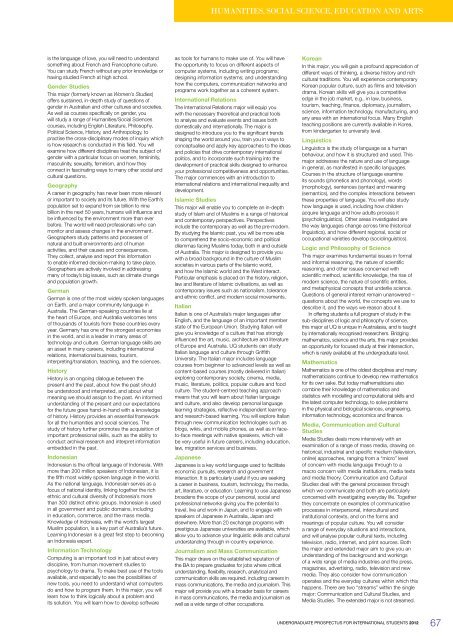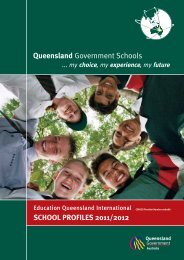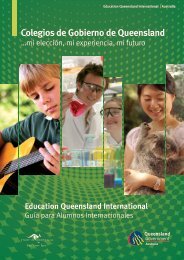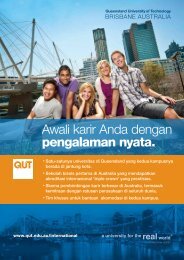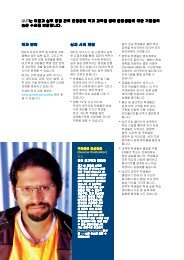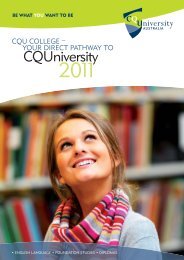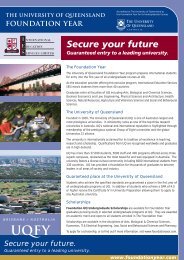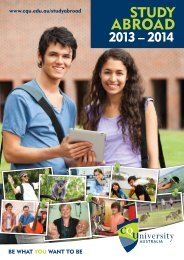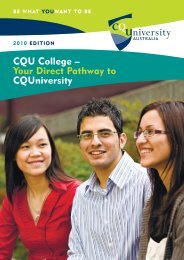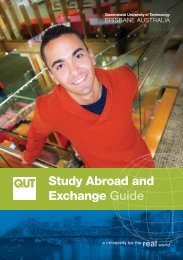UNDERgRADUATE PROSPECTUS - Study Brisbane
UNDERgRADUATE PROSPECTUS - Study Brisbane
UNDERgRADUATE PROSPECTUS - Study Brisbane
- No tags were found...
You also want an ePaper? Increase the reach of your titles
YUMPU automatically turns print PDFs into web optimized ePapers that Google loves.
Humanities, Social Science, Education and Arts<br />
is the language of love, you will need to understand<br />
something about French and Francophone culture.<br />
You can study French without any prior knowledge or<br />
having studied French at high school.<br />
Gender Studies<br />
This major (formerly known as Women’s Studies)<br />
offers sustained, in-depth study of questions of<br />
gender in Australian and other cultures and societies.<br />
As well as courses specifically on gender, you<br />
will study a range of Humanities/Social Sciences<br />
courses, including English Literature, Philosophy,<br />
Political Science, History, and Anthropology, to<br />
practise the cross-disciplinary modes of inquiry which<br />
is how research is conducted in this field. You will<br />
examine how different disciplines treat the subject of<br />
gender with a particular focus on women, femininity,<br />
masculinity, sexuality, feminism, and how they<br />
connect in fascinating ways to many other social and<br />
cultural questions.<br />
Geography<br />
A career in geography has never been more relevant<br />
or important to society and its future. With the Earth’s<br />
population set to expand from six billion to nine<br />
billion in the next 50 years, humans will influence and<br />
be influenced by the environment more than ever<br />
before. The world will need professionals who can<br />
monitor and assess changes in the environment.<br />
Geographers study patterns and processes of<br />
natural and built environments and of human<br />
activities, and their causes and consequences.<br />
They collect, analyse and report this information<br />
to enable informed decision-making to take place.<br />
Geographers are actively involved in addressing<br />
many of today’s big issues, such as climate change<br />
and population growth.<br />
German<br />
German is one of the most widely spoken languages<br />
on Earth, and a major community language in<br />
Australia. The German-speaking countries lie at<br />
the heart of Europe, and Australia welcomes tens<br />
of thousands of tourists from these countries every<br />
year. Germany has one of the strongest economies<br />
in the world, and is a leader in many areas of<br />
technology and culture. German language skills are<br />
an asset in many careers, including international<br />
relations, international business, tourism,<br />
interpreting/translation, teaching, and the sciences.<br />
History<br />
History is an ongoing dialogue between the<br />
present and the past, about how the past should<br />
be understood and interpreted, and about what<br />
meaning we should assign to the past. An informed<br />
understanding of the present and our expectations<br />
for the future goes hand-in-hand with a knowledge<br />
of history. History provides an essential framework<br />
for all the humanities and social sciences. The<br />
study of history further promotes the acquisition of<br />
important professional skills, such as the ability to<br />
conduct archival research and interpret information<br />
embedded in the past.<br />
Indonesian<br />
Indonesian is the official language of Indonesia. With<br />
more than 200 million speakers of Indonesian, it is<br />
the fifth most widely spoken language in the world.<br />
As the national language, Indonesian serves as a<br />
focus of national identity, linking together the rich<br />
ethnic and cultural diversity of Indonesia’s more<br />
than 300 distinct ethnic groups. Indonesian is used<br />
in all government and public domains, including<br />
in education, commerce, and the mass media.<br />
Knowledge of Indonesia, with the world’s largest<br />
Muslim population, is a key part of Australia’s future.<br />
Learning Indonesian is a great first step to becoming<br />
an Indonesia expert.<br />
Information Technology<br />
Computing is an important tool in just about every<br />
discipline, from human movement studies to<br />
psychology to drama. To make best use of the tools<br />
available, and especially to see the possibilities of<br />
new tools, you need to understand what computers<br />
do and how to program them. In this major, you will<br />
learn how to think logically about a problem and<br />
its solution. You will learn how to develop software<br />
as tools for humans to make use of. You will have<br />
the opportunity to focus on different aspects of<br />
computer systems, including writing programs;<br />
designing information systems; and understanding<br />
how the computers, communication networks and<br />
programs work together as a coherent system.<br />
International Relations<br />
The International Relations major will equip you<br />
with the necessary theoretical and practical tools<br />
to analyse and evaluate events and issues both<br />
domestically and internationally. The major is<br />
designed to introduce you to the significant trends<br />
shaping the world around you, train you in ways to<br />
conceptualise and apply key approaches to the ideas<br />
and policies that drive contemporary international<br />
politics, and to incorporate such training into the<br />
development of practical skills designed to enhance<br />
your professional competitiveness and opportunities.<br />
The major commences with an introduction to<br />
international relations and international inequality and<br />
development.<br />
Islamic Studies<br />
This major will enable you to complete an in-depth<br />
study of Islam and of Muslims in a range of historical<br />
and contemporary perspectives. Perspectives<br />
include the contemporary as well as the pre-modern.<br />
By studying the Islamic past, you will be more able<br />
to comprehend the socio-economic and political<br />
dilemmas facing Muslims today, both in and outside<br />
of Australia. This major is designed to provide you<br />
with a broad background in the culture of Muslim<br />
societies in various parts of the Islamic world,<br />
and how the Islamic world and the West interact.<br />
Particular emphasis is placed on the history, religion,<br />
law and literature of Islamic civilisations, as well as<br />
contemporary issues such as nationalism, tolerance<br />
and ethnic conflict, and modern social movements.<br />
Italian<br />
Italian is one of Australia’s major languages after<br />
English, and the language of an important member<br />
state of the European Union. <strong>Study</strong>ing Italian will<br />
give you knowledge of a culture that has strongly<br />
influenced the art, music, architecture and literature<br />
of Europe and Australia. UQ students can study<br />
Italian language and culture through Griffith<br />
University. The Italian major includes language<br />
courses from beginner to advanced levels as well as<br />
content-based courses (mostly delivered in Italian)<br />
exploring contemporary society, cinema, media,<br />
music, literature, politics, popular culture and food<br />
culture. The student-centred teaching approach<br />
means that you will learn about Italian language<br />
and culture, and also develop personal language<br />
learning strategies, reflective independent learning<br />
and research-based learning. You will explore Italian<br />
through new communication technologies such as<br />
blogs, wikis, and mobile phones, as well as in faceto-face<br />
meetings with native speakers, which will<br />
be very useful in future careers, including education,<br />
law, migration services and business.<br />
Japanese<br />
Japanese is a key world language used to facilitate<br />
economic pursuits, research and government<br />
interaction. It is particularly useful if you are seeking<br />
a career in business, tourism, technology, the media,<br />
art, literature, or education. Learning to use Japanese<br />
broadens the scope of your personal, social and<br />
professional networks giving you the potential to<br />
travel, live and work in Japan, and to engage with<br />
speakers of Japanese in Australia, Japan and<br />
elsewhere. More than 20 exchange programs with<br />
prestigious Japanese universities are available, which<br />
allow you to advance your linguistic skills and cultural<br />
understanding through in-country experience.<br />
Journalism and Mass Communication<br />
This major draws on the established reputation of<br />
the BA to prepare graduates for jobs where critical<br />
understanding, flexibility, research, analytical and<br />
communication skills are required, including careers in<br />
mass communications, the media and journalism. This<br />
major will provide you with a broader basis for careers<br />
in mass communications, the media and journalism as<br />
well as a wide range of other occupations.<br />
Korean<br />
In this major, you will gain a profound appreciation of<br />
different ways of thinking, a diverse history and rich<br />
cultural traditions. You will experience contemporary<br />
Korean popular culture, such as films and television<br />
drama. Korean skills will give you a competitive<br />
edge in the job market, e.g., in law, business,<br />
tourism, teaching, finance, diplomacy, journalism,<br />
science, information technology, manufacturing, and<br />
any area with an international focus. Many English<br />
teaching positions are currently available in Korea,<br />
from kindergarten to university level.<br />
Linguistics<br />
Linguistics is the study of language as a human<br />
behaviour, and how it is structured and used. This<br />
major addresses the nature and use of language<br />
in general, as manifested in specific languages.<br />
Courses in the structure of language examine<br />
its sounds (phonetics and phonology), words<br />
(morphology), sentences (syntax) and meaning<br />
(semantics), and the complex interactions between<br />
these properties of language. You will also study<br />
how language is used, including how children<br />
acquire language and how adults process it<br />
(psycholinguistics). Other areas investigated are<br />
the way languages change across time (historical<br />
linguistics), and how different regional, social or<br />
occupational varieties develop (sociolinguistics).<br />
Logic and Philosophy of Science<br />
This major examines fundamental issues in formal<br />
and informal reasoning, the nature of scientific<br />
reasoning, and other issues concerned with<br />
scientific method, scientific knowledge, the rise of<br />
modern science, the nature of scientific entities,<br />
and metaphysical concepts that underlie science.<br />
Questions of general interest remain unanswered –<br />
questions about the world, the concepts we use to<br />
describe it, and the ways we reason about it.<br />
In offering students a full program of study in the<br />
sub-disciplines of logic and philosophy of science,<br />
this major at UQ is unique in Australasia, and is taught<br />
by internationally recognised researchers. Bridging<br />
mathematics, science and the arts, this major provides<br />
an opportunity for focused study at their intersection,<br />
which is rarely available at the undergraduate level.<br />
Mathematics<br />
Mathematics is one of the oldest disciplines and many<br />
mathematicians continue to develop new mathematics<br />
for its own sake. But today mathematicians also<br />
combine their knowledge of mathematics and<br />
statistics with modelling and computational skills and<br />
the latest computer technology, to solve problems<br />
in the physical and biological sciences, engineering,<br />
information technology, economics and finance.<br />
Media, Communication and Cultural<br />
Studies<br />
Media Studies deals more intensively with an<br />
examination of a range of mass media, drawing on<br />
historical, industrial and specific medium (television,<br />
online) approaches, ranging from a “micro” level<br />
of concern with media language through to a<br />
macro concern with media institutions, media texts<br />
and media theory. Communication and Cultural<br />
Studies deal with the general processes through<br />
which we communicate and both are particularly<br />
concerned with investigating everyday life. Together<br />
they concentrate on examples of communicative<br />
processes in interpersonal, intercultural and<br />
institutional contexts, and on the forms and<br />
meanings of popular culture. You will consider<br />
a range of everyday situations and interactions,<br />
and will analyse popular cultural texts, including<br />
television, radio, internet, and print sources. Both<br />
the major and extended major aim to give you an<br />
understanding of the background and workings<br />
of a wide range of media industries and the press,<br />
magazines, advertising, radio, television and new<br />
media. They also consider how communication<br />
operates and the everyday cultures within which this<br />
happens. There are two “streams” within the single<br />
major: Communication and Cultural Studies, and<br />
Media Studies. The extended major is not streamed.<br />
UNDERGRADUATE <strong>PROSPECTUS</strong> FOR INTERNATIONAL STUDENTS 2012<br />
67


